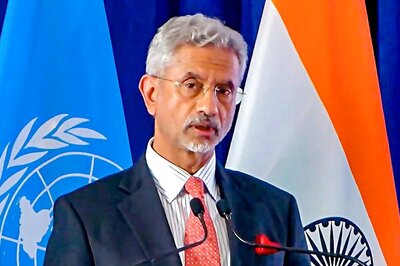
views
The Indian Institute of Technology Madras has launched the Sudha Gopalakrishnan Brain Centre that aims to power “Global Project” to map the human brain at the cellular and connectivity levels, with a focus on high-resolution brain imaging.
IIT Madras plans to train hundreds of undergraduate and postgraduate students at this Centre in neuroscience and computing, machine learning techniques on brain data, claims the press release by the institute.
Addressing the inaugural event, Prof K. VijayRaghavan, principal scientific adviser to the government of India, said, “The combination of IIT Madras, which has the expertise in science and data analysis, with medicine is going to be revolutionary. Going forward, we have an extraordinary problem in Neuroscience, i.e. on the functioning of human brain. We are at an earlier stage in our understanding of the human brain functioning. The IIT Madras brain centre will help in solving complex issues that will benefit the world.”
Further, Prof K VijayRaghavan said, “The dynamic leadership of IIT Madras has shown the ability to herd different kinds of complex talent together. The IIT Madras Research Park is an example and today every institution wants to copy the model.”
The first ongoing project of the Centre titled ‘Computational and Experimental Platform for High-Resolution Terapixel Imaging of ex-vivo Human Brains’ for high-throughput light microscopic imaging of whole human brains is supported by the office of principal scientific adviser to the government of india. Through this project, the Centre has developed a high-throughput histology pipeline that processes whole human brains into high-resolution digital images.
“Using this technology platform, the Centre is imaging post-mortem human brains of different types and ages. The Centre has already acquired whole brain serial-section cell-resolution volumes of three developing brains to date. These unique first-in-class data sets that provide a high-resolution view of developing brains will be released in the near future,” added the institute.
Speaking on the occasion, Kris Gopalakrishnan, alumnus of IIT Madras, said, “Entrepreneurship and development in science and technology are important for the nation’s growth. While there have been great strides in supporting entrepreneurship, there is a need for more support to foster world-class research in India. Scientists and engineers play an important role in feeding the knowledge economy of the country. The country has the right talent, resource and opportunity in leading some areas globally. ”
Congratulating the Researchers, Prof. V. Kamakoti, director, IIT Madras, said, “The Brain Research Centre is a great case study which proves that technology can contribute to medicine and solve societal problems. The Centre will make deep in-roads in collecting data for brain research.”
Further, Prof. Mohanasankar Sivaprakasam, department of electrical engineering, IIT Madras, and Head of Sudha Gopalakrishnan Brain Centre said, “The technology platform we have developed and our strong medical collaborations, is allowing us to generate high-resolution large-format histology sections of human brains that will advance the field significantly.”
Elaborating about the research work, Prof. Partha Mitra, professor, Cold Spring Harbor Laboratory and visiting chair professor, IIT Madras, said, “3D digital neuroanatomy of the postmortem human brain with cellular resolution is a field with great potential for scientific discovery and also for the understanding of neurological disorders. The unique data sets being generated here promise to be widely impactful through open sharing with an international research community.”
Highlighting the collaboration between IIT Madras and CMC for the project, Dr. George Varghese, Professor, CMC Vellore, said, “The Brain Research Centre has a huge potential in solving some of the major medical issues. The research work undertaken at the Centre will help in bringing different outcomes for patients. This unusual combination of science and technology with medicine is the way to go forward.
The Centre is supported by Kris Gopalakrishnan and Sudha Gopalakrishnan. Their dedicated efforts in seeding research at IIT Madras at the intersection of Neuroscience and Engineering are now powering this Centre in the frontier research area of brain mapping, added the institute.
Read all the Latest Education News and Breaking News here




















Comments
0 comment